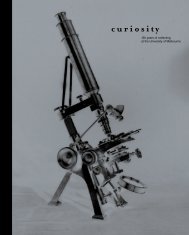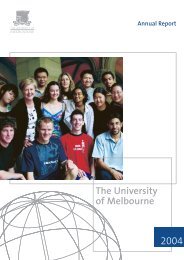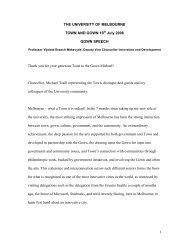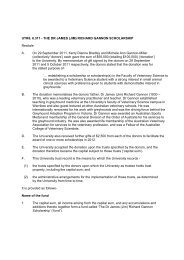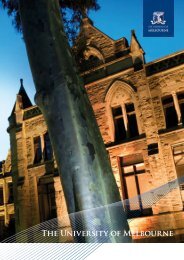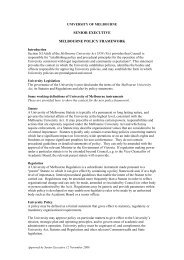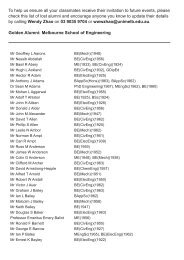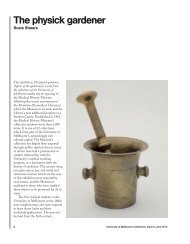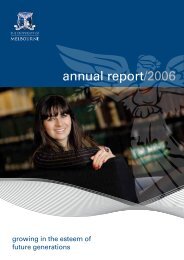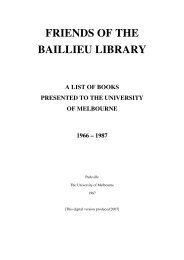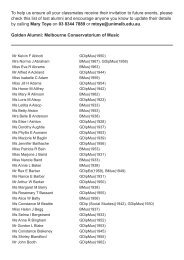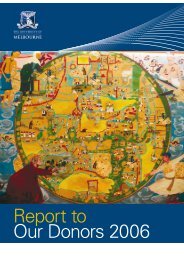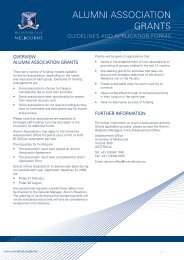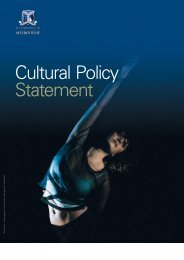2010 International Undergraduate Prospectus nts. u.au
2010 International Undergraduate Prospectus nts. u.au
2010 International Undergraduate Prospectus nts. u.au
Create successful ePaper yourself
Turn your PDF publications into a flip-book with our unique Google optimized e-Paper software.
15<br />
Depth<br />
Developing a specialisation<br />
The New Generation Bachelor of Arts<br />
degree is designed to give you disciplinespecific<br />
knowledge and develop new ways<br />
of thinking by exposing you to a diverse<br />
range of perspectives. To complement the<br />
principles of the Melbourne Model, we have<br />
developed a range of eight new first-year<br />
interdisciplinary foundation subjects that<br />
draw on a variety of different areas of study<br />
within Arts.<br />
Our new interdisciplinary foundation<br />
subjects will enable you to explore core<br />
ideas across our vast range of disciplines<br />
in your first year, assisting you in making<br />
an informed decision regarding your<br />
specialisation or study major at secondand<br />
third-year level. Through studying Arts<br />
interdisciplinary foundation subjects you will<br />
be part of a common first-year Arts learning<br />
community and benefit from our interactive<br />
online learning environment, forums and<br />
discussion groups.<br />
More information is available at:<br />
www.ba.unimelb.edu.<strong>au</strong>/ugrad/<br />
interdisciplinary-foundation/<br />
Breadth<br />
Developing knowledge across<br />
disciplines<br />
The breadth component of a Melbourne<br />
BA means that stude<strong>nts</strong> need to study a<br />
quarter of their degree (six subjects, a total<br />
of 75 poi<strong>nts</strong>) outside the core program<br />
and outside the Faculty of Arts. While<br />
an Arts degree guarantees an in-depth<br />
understanding of your chosen discipline,<br />
the breadth component ensures a wider<br />
breadth of understanding. Breadth subjects<br />
will enable you to tap other bodies of<br />
knowledge and methods of enquiry, and to<br />
develop personal and professional skills.<br />
Bachelor of Arts Graduate Pathways<br />
Bachelor of Arts<br />
Duration: 3 years full-time<br />
Choose from 33 disciplines<br />
in humanities and social<br />
sciences, and languages<br />
www.ba.unimelb.edu.<strong>au</strong><br />
Honours<br />
Available in: A variety of disciplines including humanities and<br />
social sciences, and languages<br />
Duration: 1 year full-time<br />
An Honours year enables you to extend your knowledge of your<br />
major or area of specialisation through higher-level Honours<br />
subjects and by undertaking an independent research thesis in a<br />
single area of study under the guidance of an academic supervisor.<br />
Graduate research programs Q<br />
Duration: Masters by Research<br />
1.5 years full-time<br />
Duration: Doctor of Philosophy (PhD)<br />
3 years full-time<br />
www.arts.unimelb.edu.<strong>au</strong>/futurestude<strong>nts</strong>/research<br />
Graduate professional development programs Q<br />
Duration: Generally 2 years full-time<br />
Title: Master of (unless specified):<br />
Including: Applied Linguistics, Art Curatorship, Arts Management, Cinema Management, Development<br />
Studies, Global Media Communications, <strong>International</strong> Politics, Islamic Studies, Public Policy and<br />
Management, Publishing and Communications<br />
Graduate professional entry programs Q<br />
Duration: Generally 2–3 years full-time<br />
Title: Master of (unless specified):<br />
Including: Cultural Materials Conservation, Genetic Counselling, Information Systems, Law -The Melbourne<br />
JD (Juris Doctor), Management (Accounting), Psychology, Social Work, Teaching. See pages 80–97 for more<br />
information.<br />
Employment: Melbourne Arts graduates enjoy careers both locally and abroad in areas such as media and publishing, business, government, education,<br />
community and creative arts industries. See: www.ba.unimelb.edu.<strong>au</strong>/pathwayscareers.html<br />
Q Selection into these programs is based on performance in an undergraduate degree and additional selection criteria may also apply. Note this information indicates many, but not all<br />
possible pathways to graduate study. Guaranteed pathways to graduate professional entry degrees exist for high-achieving school-leavers. See: www.futurestude<strong>nts</strong>.unimelb.edu.<strong>au</strong>/<br />
<strong>au</strong>st/apg/apgpathway.html for details.



